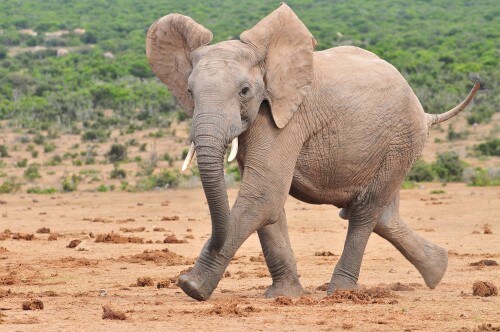The question the researchers are asking is how elephants, who have a hundred times more cells than humans and therefore have a greater chance of getting cancer, developed resistance against malignant tumors, and whether it is possible to imitate their defense mechanisms in order to develop medical treatments for humans.

By: Dafna Haim-Langford
Elephants are an ongoing enigma and subject of research regarding their resistance to various cancers. As with other animals, in elephants, only rarely are malignant tumors found. Cancer mortality in elephants is less than 5%, while in humans, despite all the treatments and drugs, cancer mortality reaches 25-11%. The question the researchers are asking is how elephants, who have a hundred times more cells than humans and therefore have a greater chance of getting cancer, developed resistance against malignant tumors, and whether it is possible to imitate their defense mechanisms in order to develop medical treatments for humans.
In collaboration with the Hogle Zoo and the Bros Ringling Elephant Conservation Center, researchers from the University of Utah analyzed the white blood cells, from elephant blood taken as part of routine tests. They tested the effect of white blood cells on damaged DNA, which is a catalyst for cancer. In response, the damaged cells destroyed themselves. The scientists found that elephants have a system, activated by a gene that codes for the p53 protein, which the researchers believe helps inhibit the development of malignant tumors in mammals.
Further analysis found that elephants have at least 40 copies of the gene that codes for the p53 protein, while humans have only two. Another clue to the importance of the p53 protein is the fact that half of the people with cancer lack a functional p53 protein.
The evolutionary explanation for the resistance of elephants against cancer compared to humans, as Prof. Schiffman describes it, stems from the duration of the fertility period of the elephants, relatively throughout their lives. While women are fertile until the age of 40 on average, elephants are fertile most of their lives, so cancer diseases can cause the extinction of the species, and therefore an effective defense mechanism against malignant diseases in elephants has developed during evolution.
New approaches to cancer treatment, based on the p53 protein, are now in applied research, while finding synthetic analogues to the "elephant" p53 protein, with the aim of producing protection against human cancer cells. The researchers benefit from a million dollar grant to continue their research.
Not just elephants: many studies on cancer-resistant animals are being carried out at universities around the world. The crocodile, the whale and the rat are all a source of inspiration for testing defense mechanisms against cancer cells. An attempt has also been made to find a cure for other diseases by imitating animal molecules and mechanisms, and collaboration between zoologists, biologists and doctors can lead to medical breakthroughs, as has already been proven in various cases.

8 תגובות
Yooooo
I was looking for something about Biomimicry and I finally found something encouraging, it's really important, I hope it works
I was looking for something about biomimicry and finally found something encouraging
Another thought:
The increase in the beginning of life thanks to modern medicine, causes a change in the statistics of the causes of death.
I haven't checked the numbers, but it's possible that without modern medicine, the percentage of cancer deaths would have been much lower, if only because many would have died of other causes,,,
In my opinion, the main difference is found in a more natural diet (an elephant does not eat junk food), and without industrial substances in the food, as well as in a less urban environment (less radiation).
It has long been clear to science that the above factors increase the chance of developing cancer
Beautiful questions. You should check other directions.
Have you thought about the fact that elephants and in fact all other animals, unlike humans, live in different mental conditions than humans?
Does an elephant live in stress? Does he worry all day how he will close the month, afraid of the security situation, or troubled by the thought of whether his child will finally find a bride even though he is almost 40 years old...?
Man lives an unbalanced, unnatural mental life. All the stress in which he lives greatly affects his health.
Elephants and other animals live in the "here and now". No worries about the future or regrets about the past. An excellent recipe for peace of mind.
I estimate that this is one of the reasons, and maybe not one of the main ones, for the low mortality of elephants from cancer.
The elephant does not live in a very 'clean' environment like humans, does not drink filtered water, lives in mud and filth, and therefore, perhaps, (evolutionarily) has developed a much stronger immune system than us (and the article indicates the means in the elephant's blood) that will face many more risks, then Cancer is treated in his body more effectively.
and alligators
http://news.nationalgeographic.com/news/2008/04/080407-alligator-blood.html